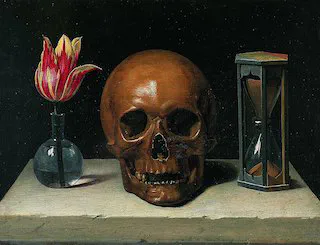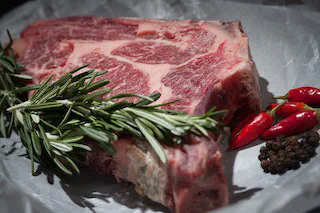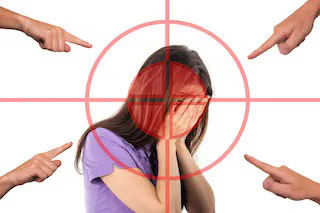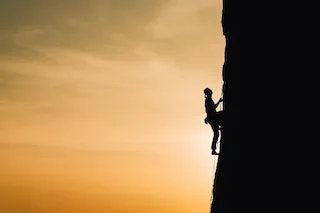
Are you really sure that 'You Only Live Once'?
- Matthieu P.J.
- Spirituality
- January 15, 2021
Picture above: Philippe de Champaigne’s Vanitas (painting from c. 1671).
A vanitas is a symbolic work of art showing the transience of life.
[Credit: Wikipedia .]
We all heard it at some point, the famous “You Only Live Once” or YOLO as it’s come to be shortened, and its questionable implications. It’s been reminded to me recently when an old acquaintance wrote ‘I had the realisation that we only have one life and I wanted to live mine without regrets’. While in his situation it acted as a powerful motivation to go through a deep personal transformation, I realised how confusing and misinterpreted the YOLO belief can be.
Today I will share my vision and why the YOLO justification for doing certain things in life is actually a fallacy with possible negative consequences; how the topic of reincarnation has been removed from the mainstream religions; and why surprisingly the fear of death can be a force that pushes you to do your best in life.
Table of Contents
Time to drop the “You Only Live Once”
Can we really be surprised at the lack of morality of this world, the fights for power (between people, companies, nations etc.) or how we treat our planet? When you’re convinced that this is your only shot on planet Earth—or even in the entire creation, given that officially we’re still alone in the entire universe—can you really expect people to treat their fellow human with dignity?
When the many are convinced that they embarked since birth on a race for survival, should we be surprised that some would do anything to become successful in life—at least with the definition that’s been sold to them: a respected job, lots of money, big house and car, attractive partner etc.—including stepping on your dead body if you’re in the way?
No wonder our society can be so dysfunctional sometimes. We’ve been sold a lie, a limiting belief that has been incorporated as a core belief for most of humanity: “You Only Live Once” so you’d better get the most out of it. Similar attitudes can be found in other expressions like: ‘Work Hard, Play Harder ’. They’re used mostly to justify a life full of excess, lack of self-respect and respect towards others or the environment—or anything for that matter. That sends a desperate message to the masses: get the most out of this big life because one, day sooner than you think, you’ll be six feet under. What a grim perspective for whoever was born in this world.
That reminds me of the excellent X-Box commercial from the early 2010s. Whoever created that video did well to capture the essence of what most people dread their life is: a quick journey from cradle to grave.
Now I’d like you to stop here for a moment and be honest with yourself. Do you realise that the belief of having only one life can be responsible for how you behave in life? And do you believe it does you any good?
Now I want to introduce the oppositive view: that despite all you’ve been told, you are actually not here for the first time—nor the last—and what you do has actually very significant impacts beyong this current life. You don’t have to believe it, you can just take it as an intellectual or philosophical reflection to begin with.
Reincarnation at the core of many spiritual traditions
The history of our mainstream religions is quite fascinating. I’ll focus on Christianity here. It is now clear that in the early days of the Christ teachings, reincarnation was part of the package so to speak. How come it did not survive to the present day? Well, it simply did not make it through the centuries and the multiple edits of the Bible. It is often thought that it is during the Council of Nicaea in 325 that references to reincarnation were stripped out. If you are interested in that, you can read books about the Gnostics and the early Christian teachings. And as far as I know in Islam there’s no mention of reincarnation neither in the scriptures.
Now in the East, the concept of reincarnation is conversely quite common! To mention just three religions: Hinduism, Jainism and Buddhism have the concept of reincarnation. Ok and what does it mean?
DEFINITION
Reincarnation, also known as rebirth or transmigration, is the philosophical or religious belief that the non-physical essence of a living being begins a new life in a different physical form or body after biological death. [Wikipedia ]
Let’s say that reincarnation is a particular belief about life after death. It means that not only you survive after your physical body perishes, but you also keep having experiences in other bodies (humans or others). Now logically, it also means that most likely it’s not your first time around as a human being on planet Earth. That you’ve likely been here before.
Reincarnation is a consistent framework that actually explains so many things: why some kids show early signs of a gift for certain things (e.g. playing music), why people get a sense of familiarity when they visit a place, why when two people meet for—apparently—the first time they can sometimes feel a deep sense of familiarity, why we have some irrational fears from a young age about certain things (e.g. driving cars if you died in a car accident, or water if you died drowned) etc.
So in the East many people take reincarnation for granted, but in the West it’s been radio silent about the topic for so long. Even among the few people I know who go to Church, few genuinely believe in the ‘great beyond’. Maybe the 2020 Disney’s Soul movie can help the concept of reincarnation going mainstream? That would be about time!
There’s a common reaction among spiritual people. When they’re questioned ‘Do you believe in reincarnation?’ they reply ‘I don’t believe it, I know reincarnation to be a reality of this universe.’ Now it’s a tricky one because people will have to wait and die to know for sure… Unfortunately, only that moment of passing will give them the proof they ask for. Ah… not very practical! In the meantime it seems to be a matter of belief for most people.
To finish, I just want to address one common argument against reincarnation. And that is: ‘Why do I not remember my past lives?’ Well, it’s usually for your own good so you can have another play. But nowadays, many young people do remember some element of their past lives. As it becomes something considered genuine and no longer of fantasy of kids and as parents become more open-minded, we are going to witness an explosion of the number of kids who will tell the story of their past lives to their parents. Hopefully that will help the collective belief shift.
How we try to keep death ‘out of sight’
When I was a kid, some friends of my parents were joking that as you age, your body odour starts changing and you literally ‘smell old’ and that’s a sign of putrefaction and that you are getting closer to the grave. I listened, silent, already feeling the discomfort of those adults barely in their forties who were showing early anxiety signs of getting older—and dying.
Denying death would be a folly, yet our western societies do desperately try to hide the reality of ageing. It seems to generate so much discomfort in most people to be reminded of death, that every effort is taken to keep it out of our sight. It’s taboo. Along with sex, death is second biggest taboo in our societies. One way to know for sure is that most adults don’t use the word ‘death’ in front of kids or even among themselves. Rather than he ‘died’, you’re more likely to hear things like he ‘passed away’, he ‘rests in peace’, he ‘kicked the bucket’.
We see everywhere the glorification of being young, attractive and sexy; lots of content we’re exposed to (TV, movies, magazines etc.) seem to be obessessed by staying young. But wait a minute, people must know they won’t stay young forever, right? Well, they like to pretend. Here come the controversial cosmetics, the plastic surgeries and endless efforts to hide the visible signs of ageing.
Another typical symptom is that we do not want to embarass ourselves with seeing our relatives ageing. While in the East the elder usually live with their kids and grandkids (which, granted, is not without causing some friction between generations), in the West we put our elder in care homes—many of which do not treat our ancestors with much dignity. We put them away from our eyes, so we do not witness this ‘awful’ ageing situation.
That’s a lot of efforts to avoid us being reminded of the inevitable; a lot of efforts to avoid facing our own mortality. What, is there nothing good at all about becoming older? In a society obsessed with appearances and superficiality, it seems not. I can’t agree because I see lots of good positive things about getting older. I see the accumulation of life experience, the rapidity with which you can execute certain tasks because you’ve become very efficient at it, and an obvious deepening of self-knowledge that leads to wisdom.
The fear of death
Yes, most people are afraid of death, but won’t recognise it. That’s a deep fear they carry inside them. It torments them every now and then, but it’s mostly repressed, in the subconscious. And any repressed feeling is a recipe for disaster…
Rarely have I met people who would bring the topic. There was one man once who explained that in his forties he ‘came to term with his mortality’ and I could feel all the vibrance and the wisdom in his voice. I don’t think he even believed in life after death, he just accepted the inevitability of death; he was at peace with it.
Now rather than seeing you in a YOLO scenario, what if reincarnation was true? Well, I’m here to highlight that it has dramatic consequences on the way many people live their life.
Instead of seeing this life as a one-off chance, they would start seeing that actually they had done things before being born. Positive things and negative things. They accumulated an energy called karma that seeks to find its balance. Karma means that what you did to another, you will need to live it yourself to be even. That also means that people are born with certain past-lives traumas that are completely inexplicable if we focus on their present life alone.
Instead of seeing this life as a race to success with much contempt for others on their way, jealousy and all the low-vibration energies, people would see that everyone deserves to be treated with fairness and respect. Otherwise, one day they will experience the same kind of bad treatment they give to others this time around—and that day may be in a future life.
Instead of seeing this Earth as disposable, wasting its limited natural resources and treating the environment poorly, people would realise that they can be reborn in one or two generations and inherit an environmental situation that they contributed to create last time around.
Also and importantly, instead of thinking that they don’t need to address their personal issues, that they don’t need to change—even though the entire universe may be sending them clear messages that they are in a dead-end—people would realise that they are in the right place at the right time and they need to take ownership of their life. And to take an extreme, I am afraid to say but suicide is no escape. It’s just a reset but the lessons that have not been learned will have to be. It’s just rebooting the video game instead of carrying on in the current round.
In many regards, when I realised that I had been on Earth before and that I will be reborn again, I felt a deep sense of empowerment. That was the end of a limiting—and completely absurd—belief that I had carried in my youth. That was the beginning of a life that I had to get right: rectifying the past lives mistakes, retrieving my plan for being on Earth and carrying on where I had left it at. Once you realise the universal truth of reincarnation, you won’t be the same. That’s when you stop being afraid of dying in the sense that you know your spiritual essence, your soul, will live on.
Transmuting your mortality into a positive motivation
Once you come to terms with your mortality, you can investigate how you can actually use that energy in a positive manner. After all, knowing the clock is ticking and the end of you current life is inevitable, don’t you want to get the most out of your life? There is a powerful energy in there. An energy to achieve greatness and bring love into your life, instead of the selfish and ruthless attitude that unfortunately a YOLO person may adopt. There is the possibility to transmute this fear of dying into the energy of action, the energy of change, the energy of life!
In her 2012 book ‘The Top Five Regrets of the Dying’, Bronnie Ware describes what she had heard while working as a nurse in palliative care for many years in Australia. The five most common regrets shared by people nearing death were:
- “I wish I’d had the courage to live a life true to myself, not the life others expected of me.”
- “I wish I hadn’t worked so hard.”
- “I wish I’d had the courage to express my feelings.”
- “I wish I had stayed in touch with my friends.”
- “I wish that I had let myself be happier.”
After reading these 5 items, can you recognise yourself in any of them? If so, are you not willing to take actions right now to live a life more aligned with your true self, a life of fulfilment? And you can take the stress out, because whatever you can’t get right this time around, you’ll have another chance to play…
Final thoughts
Most of us grew up in the old paradigm of ‘Earth is about survival of the fittest’ and YOLO. That needs to go away. These false beliefs that have been carefully harped on among mainstream culture in order to abuse people by using their fear against them (just look at the [Coronavirus crisis]) are no longer serving the human collective. The time will come when they will go away. We’ve also seen that reincarnation is a belief embraced by many spiritual traditions in the world although usually ignored in the West.
And rather than being paralysed by it, the fear of death can be transcended to push ourselves to be a better person starting today. That’s the true spirit of the latin expression carpe diem which may have given birth to the gross and distorted equivalent of YOLO. In latin it means ‘seize the day’ because time does pass, life does go on and you’d better live without regrets.
The good news is that things are changing! Just an anecdote: inspired by some ancient spiritual tradition, today there’s even an app on smartphones that generates daily reminders that ‘don’t forget, you’re going to die’. That’s just a modern version of the old adage memento mori in latin, which tells us that in order to live a happy life we must contemplate death regularly—not blatantly ignore it!
Nothing can change the reality of physical death, but it is us who decide what meaning we give it. We can adopt a positive outlook. Death is the not the end of everything as we’ve been led to believe, it’s a just a transformation. As a friend of mine recently put it, ‘perhaps we should start saying “transitioning to another dimension” instead of “dying”?’


